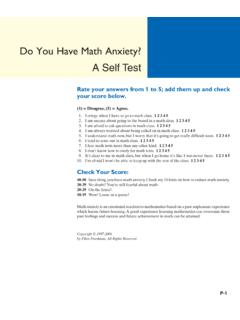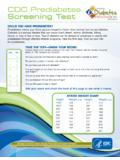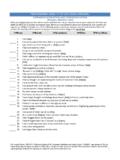Transcription of Self-Test (The four Horsemen of the Apocalypse)
1 Self-Test (THE four Horsemen OF THE apocalypse ) Yes No1. At times, during an argument, I think it is best just not to respond at all. 2. During an argument I keep thinking of ways to retaliate. 3. During a hot argument I think, It doesn t matter what you say and I stop listening. 4. During arguments, it is important to me to point out inaccuracies or explain my position. 5. I don t get credit for all the positive things I do in our relationship. 6. When my partner is upset, I think I don t have to take this kind of treatment. 7. When I see a glaring fault in my partner I can t recall my partner s positive qualities 8. I hate it when things in our discussions stop being rational.
2 9. My partner can be pretty stubborn, arrogant and smug at times 10. I let things build up for a long time before I complain. I don t complain until I feel very hurt. 11. I often feel a sense of righteous indignation when my partner is complaining. 12. I only bring up problems if I know I m right and want my partner to accept my point of view. 13. I point out patterns and analyze my partner s personality as part of my complaints. 14. I think that it is best to withdraw to calm down, avoid a big fight and not get my feelings hurt. 15. I withdraw when my partner s emotions seem out of control. 16. In a disagreement, I think it s important to determine who is at fault. 17.
3 In a discussion, I make general points instead of being specific about one situation or action. 18. In arguments I may be emotional, sarcastic, or call my partner names. Later, I regret this. 19. It s hard for me to see my partner s point of view when I don t agree. 20. When complaining to or about my partner, I use phrases like you always or you never . 21. My partner is too touchy and gets his/her feelings hurt too easily. 22. To avoid blame, I have to explain why and how the problem arose 23. When my partner complains I feel like I just want to get away from there. 24. When my partner complains, I have to control myself to keep from saying what I really feel. 25. When my partner complains, I realize that I also have complaints that need to be heard.
4 26. In arguments, sometimes my response is to sigh, or roll my eyes. SCORE: Circle any numbers you said yes to. Your total Criticism: 4 10 12 13 16 17 20 Contempt: 2 7 9 18 19 21 26 Defensiveness: 2 3 4 5 11 21 22 25 Stonewalling: 1 3 6 8 14 15 23 24 Mary Ann Carmichael, Bob & Marlene Neufeld, 2005 ; based on John Gottman, 1994 Why Marriages Succeed or Fail







